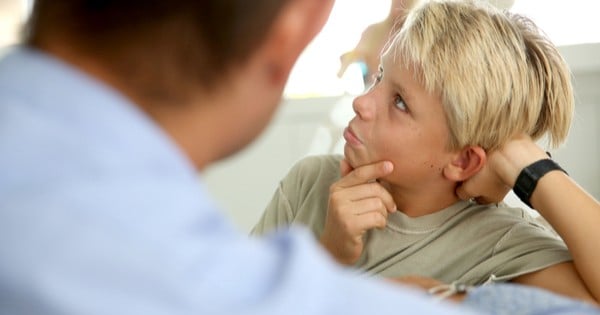
Like a volcano erupting, my nine-year-old had an emotional breakdown: sobbing uncontrollably, replaying moments from the last year of his life like each had occurred only moments ago.
He had a friend over and my son took the opportunity to release his emotions, concerns and feelings. Myself and the other parent stood out of sight, listening — for 30 minutes.
Tears welled in my eyes with so many thoughts from my failure as a parent for all of this to accumulate in such a fashion to the realization of my son expressing himself and having such a great friend to listen.
Nothing my son said was new information; however, the degree of emotion and vulnerability was on a level I had never experienced before.
Approaching my son as it was time for his friend to go home, he whispered to me, “can we have a mamma chat? Just you and me. I need to talk.”
“Absolutely.”
My son hugged his friend goodbye and we settled down for a mamma-son chat.
“It’s hard having an older sibling, but it’s even harder when their brain doesn’t work like yours and mine, and I can’t communicate with him and I need to change everything about me to make it work for him and then he just steals the spotlight. He always steals the spotlight.”
My son took a gasp for air.
“It is hard.” I paused. “ Really hard,” I acknowledged my son, repeating my words.
“It really is mamma. I don’t know what to do.”
“I don’t know either, buddy — I don’t know what I am doing either,” I reflected silently — these are not the words my son needs to hear right now. He is looking to me for answers to a question not being asked and I have none.
. . .
My nine-year-old is confident and articulate.
He is wise beyond his years; this conversation magnified that reality.
He is also the family comedian, the mischievous child and nine times out of ten, the one most likely to be the cause of any trouble.
And — he has a lot of pressure looking out for his older brother.
In reflection, my husband and I have inadvertently added to this pressure — and at this moment, I am feeling deep regret. We saw his strengths and our need for someone we could trust to look out for his neuroatypical older brother, so we leaned on him — and I am not sure this was fair.
There are moments as a parent when your screw-ups and magnified, and this is feeling like one — a big one.
. . .
Finding Balance
There is a balance between teaching responsibility and placing too much responsibility on a child.
There is also a time to recognize when adults need to step up and step in — such as the public education system and the grave reminder of its inequities when we turned to our five-year-old to help care for his older brother when we are suspicious of bullying.
As an adult, I should have known better.
As the person who knows my children better than anyone, I should have known better.
I catered to the needs of one child and neglected the needs of another in the process.
I f*fucked up. I am learning.
I will grow from this and I will do better.
I will be better and be more present for both of my children.
. . .
Having a child with special needs has an impact on the whole family.
Ensuring one-on-one time is available to all children, regularly, helps communicate every child in the family is loved and special. I am reminded that I need to make more of an effort in this area.
Additionally, extending the support system beyond the family so that the pressure does not rest on the siblings, can help better set the entire family up for success.
As a family that homeschools, our school community has a unique outreach opportunity to connect with other like-minded families.
Many in our geographic community homeschool for similar reasons as us — their children cannot function in a brick and mortar environment. My nine-year-old has gifted me with a reminder to reconnect with these families (as we emerge from the pandemic), and continue to build our mutual support system and a stronger local community to increase our resilience.
My nine-year-old’s recent emotional breakdown is becoming a breakthrough by providing these insights.
. . .
Another Perspective from a sibling of Special-Need Child
22-year old Natalie talks about growing up with a sibling with autism — first, there was denial, then anger. In an interview with the Child Mind Institute, she shares:
“You are not the most important person in your house. Your parents’ effort, and the people coming to your house, the therapist and the occupational therapist — all those people aren’t there for you, but for your brother.”
And this hits me.
My nine-year-old knows we need to cater to the needs of his sibling more than his own to keep his brother safe. This reality requires us to go about things differently.
There are some things that we can control and change, and there are many we cannot as we cannot jeopardize our child’s safety.
What if this reality makes parents choose one child’s physical safety over another child’s emotional well-being?
The Child Mind Institute continues:
Siblings feel a lot of pressure and that pressure is very, very real.
As a parent of a neuroatypical child, I am fumbling my way down a path of uncertainly.
My nine-year-olds emotions reminds me that he is also navigating this journey.
I am reminded to check in, reach out my hand, and let both of my children know — we are in this together.
We are not alone. We have each-other.
. . .
Takeaways
When our children are expressing big emotions, it is a mechanism of communication and our role as a parent is to listen.
Every outburst or extreme emotion is not an indicator of bad parenting or bad children. These moments are also opportunities to guide our children‘s learning and build a stronger, healthier relationship.
When your child needs to talk, you stop and make that your number one priority.
Give them time.
Sit with them.
Let them lead — and let yourself learn.
—
This post was previously published on A Parent Is Born.
***
From The Good Men Project on Medium
 What Does Being in Love and Loving Someone Really Mean? What Does Being in Love and Loving Someone Really Mean? |
 My 9-Year-Old Accidentally Explained Why His Mom Divorced Me My 9-Year-Old Accidentally Explained Why His Mom Divorced Me |
 The One Thing Men Want More Than Sex The One Thing Men Want More Than Sex |
 The Internal Struggle Men Battle in Silence The Internal Struggle Men Battle in Silence |
Join The Good Men Project as a Premium Member today.
All Premium Members get to view The Good Men Project with NO ADS.
A $50 annual membership gives you an all access pass. You can be a part of every call, group, class and community.
A $25 annual membership gives you access to one class, one Social Interest group and our online communities.
A $12 annual membership gives you access to our Friday calls with the publisher, our online community.
Register New Account
Log in if you wish to renew an existing subscription.
Need more info? A complete list of benefits is here.
—
Photo credit: iStock
The post Big Emotions. Big Feelings. Little Person. appeared first on The Good Men Project.
